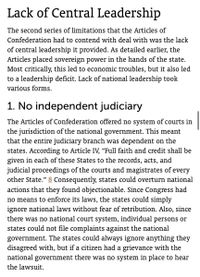Question
What was the biggest weakness that the Thais with lack of central leadership had to face

Transcribed Image Text:Lack of Central Leadership
The second series of limitations that the Articles of
Confederation had to contend with deal with was the lack
of central leadership it provided. As detailed earlier, the
Articles placed sovereign power in the hands of the state.
Most critically, this led to economic troubles, but it also led
to a leadership deficit. Lack of national leadership took
various forms.
1. No independent judiciary
The Articles of Confederation offered no system of courts in
the jurisdiction of the national government. This meant
that the entire judiciary branch was dependent on the
states. According to Article IV, "Full faith and credit shall be
given in each of these States to the records, acts, and
judicial proceedings of the courts and magistrates of every
other State." 8 Consequently, states could overturn national
actions that they found objectionable. Since Congress had
no means to enforce its laws, the states could simply
ignore national laws without fear of retribution. Also, since
there was no national court system, individual persons or
states could not file complaints against the national
government. The states could always ignore anything they
disagreed with, but if a citizen had a grievance with the
national government there was no system in place to hear
the lawsuit.
Expert Solution
This question has been solved!
Explore an expertly crafted, step-by-step solution for a thorough understanding of key concepts.
This is a popular solution
Trending nowThis is a popular solution!
Step by stepSolved in 2 steps
